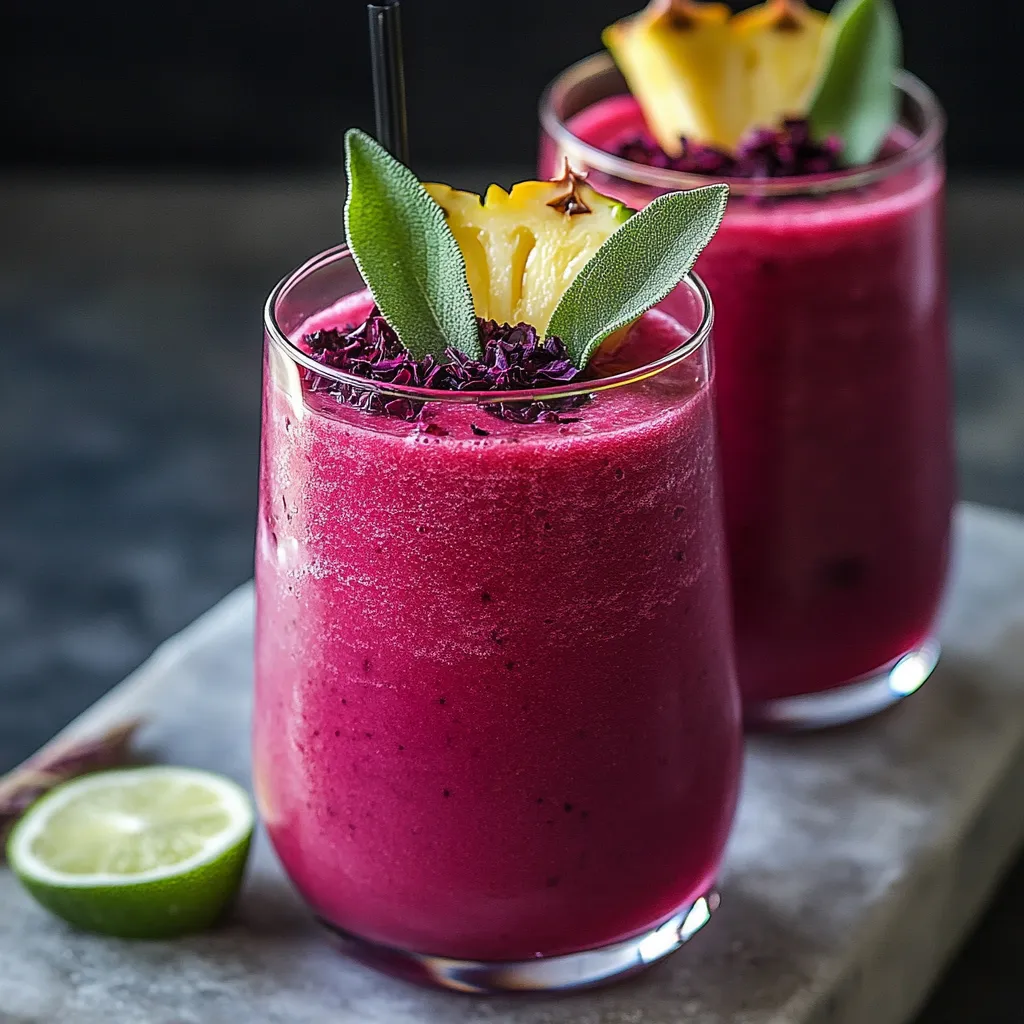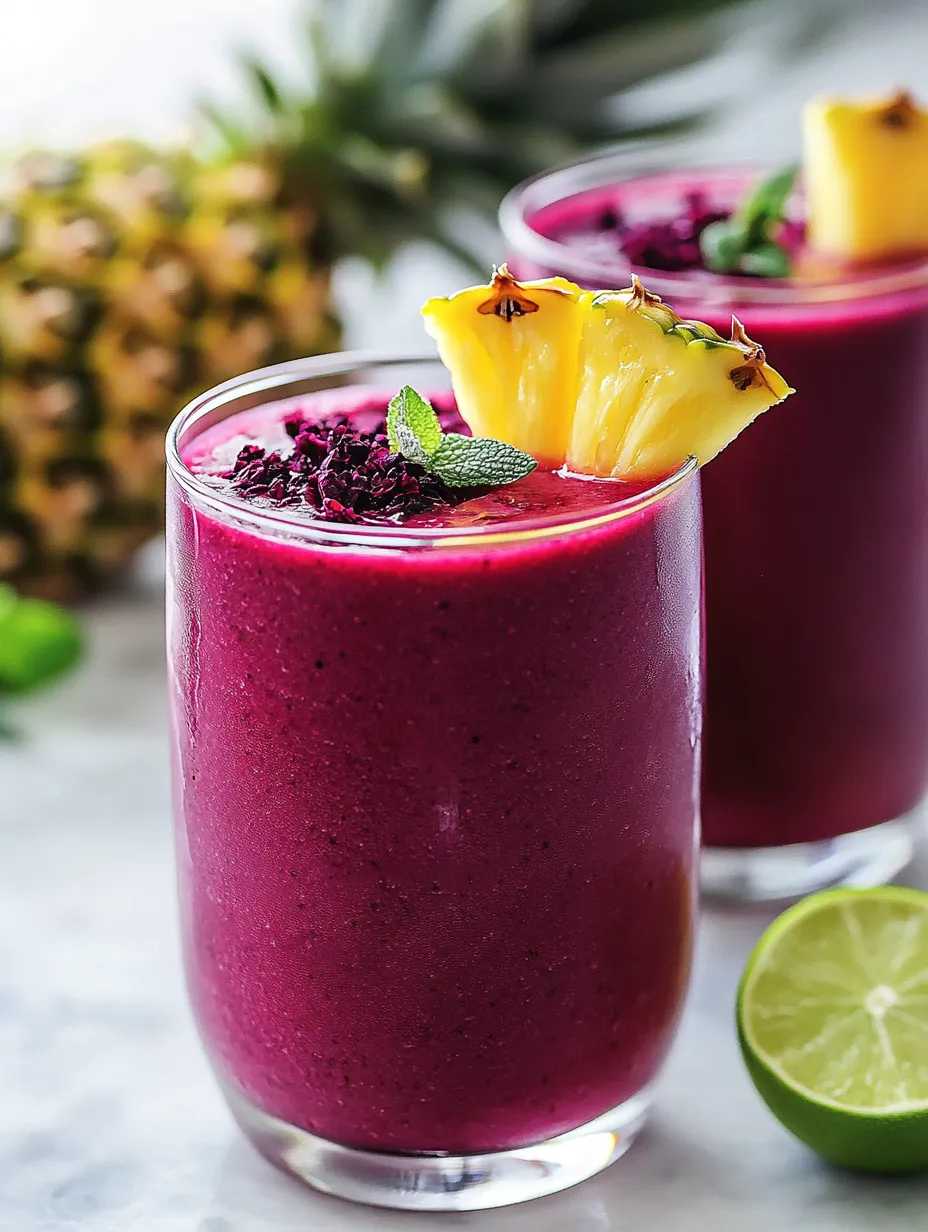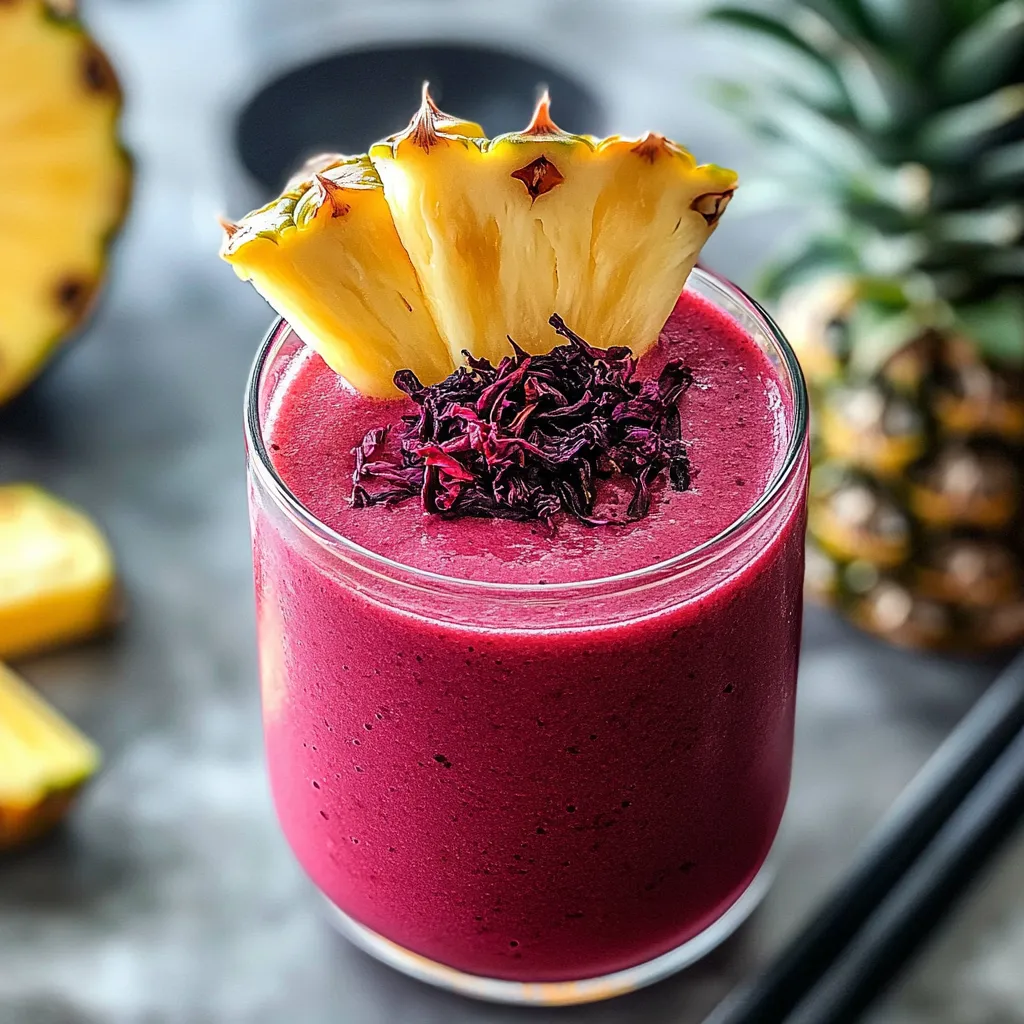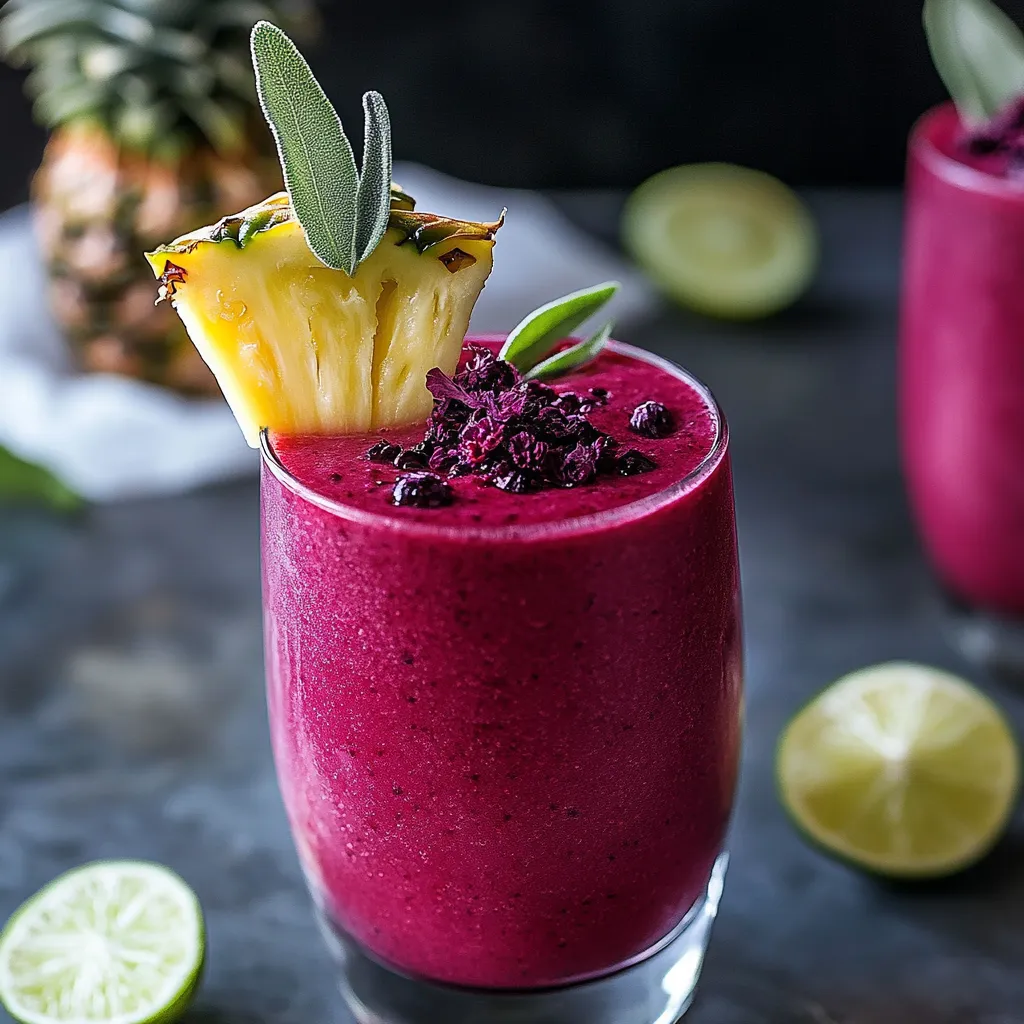 Pin it
Pin it
The striking blend of rich red hibiscus tea with sweet pineapple makes a thirst-quenching smoothie that's gorgeous and totally revitalizing. This drink brings together the tangy, almost berry flavor of hibiscus with juicy pineapple and light coconut hints, making a perfectly matched drink that feels like you're on vacation with every gulp.
I stumbled on this combo while trying to jazz up my regular hibiscus tea. When I threw in some pineapple, it felt like striking gold - they worked together so amazingly that now I can't go through summer without making it regularly.
Key Ingredients and Shopping Advice
- Hibiscus Tea: Go for bright red, complete dried flowers for the strongest taste and color. You'll get best results from those grown in Mexico or Egypt
- Pineapple: Pick one that smells sweet at the bottom and has golden skin. Make sure the top leaves look fresh
- Coconut Water: Try to find plain coconut water with no added sweeteners. Water from young coconuts tastes cleanest
- Fresh Lime: Push it against the counter before squeezing to get all the juice out
- Ice: Make it with filtered water so it won't change how your drink tastes
 Pin it
Pin it
Step-by-Step Making Instructions
- Smart Tea Brewing:
- Just bring water to a boil - cooking too long makes the tea taste bitter. Use glass or ceramic containers for the purest flavor. Keep an eye on steeping time - too much creates extra sourness. Let it cool all the way to keep that pretty color.
- Careful Mixing:
- Put in wet stuff first, then fruit. Start your blender slow to break down the pineapple chunks. Slowly turn it up to high for the smoothest result. Listen for the sound change that shows it's reached the right thickness.
- Getting Temperature Right:
- Cool your ingredients slightly before starting. Put ice in bit by bit to keep flavors strong. Watch how things mix in the blender. Stop and check thickness with a spoon now and then.
- Finishing Touches:
- Pour carefully to keep the foamy top. Add any garnishes right before serving. Use cold glasses for the best drinking temperature. Give a gentle stir if things separate.
 Pin it
Pin it
Picking the Best Hibiscus Flowers
The right hibiscus really changes this smoothie completely. Look for ones with a deep wine-red color and slightly sweet smell. I've noticed that organic hibiscus gives a cleaner, brighter taste that really stands out among the other ingredients.
Knowing When Your Pineapple's Ready
A perfectly ripe pineapple turns this smoothie from just okay to amazing. The fruit should feel solid but give a little when you press it, with a sweet smell at the bottom. If your pineapple isn't ready yet, let it sit bottom-up at room temp for a day or two.
Why Layering Matters So Much
Getting those pretty layers isn't just about looks - it actually makes drinking more fun. Each section should be different but work together, creating a journey of tastes as you drink down the glass.
My folks found out that adding just a tiny bit of sea salt brings out all the flavors while cutting down on any bitterness from the hibiscus. It's now our little secret for getting everything just right.
After trying tons of different versions, I think this smoothie shows off the perfect match between flowery and tropical tastes. The hibiscus adds a fancy touch while the pineapple brings just enough natural sweetness. It's become my favorite drink for everything from morning wellness to summer parties.
Ways to Serve and Food Matches
This smoothie looks best in tall clear glasses that show off its bright color layers. When hosting brunch, I love pouring it into champagne glasses with a pineapple piece on the edge. People always compliment how it looks and ask how to make it.
Fun Ways to Change It Up
Beyond the basic version, I've found some cool twists:
Throw in some raspberries for more antioxidants and berry flavor
Mix in fresh ginger for a bit of heat
Blend with some mint leaves to make it more refreshing
Health Advantages
The mix of hibiscus and pineapple isn't just tasty - it's loaded with good stuff:
Hibiscus helps your heart and blood pressure
Pineapple has enzymes that help digestion and fight inflammation
Coconut water gives you natural electrolytes
Having grown up somewhere tropical, I learned to love how different fruits can work together. This smoothie takes me back to warm evenings at my grandma's, where hibiscus plants grew right next to fruit trees.
This smoothie goes beyond just being a drink - it's a celebration of natural flavors and colors. Whether it starts your morning, cools your afternoon, or wows your guests, it stands out because it's so versatile and beautiful. The secret to making it perfect is using quality ingredients and paying attention to the little details.
Prep-Ahead Options
While it's best fresh, you can:
Make and chill hibiscus tea up to 3 days early
Cut and freeze pineapple chunks in serving sizes
Make frozen ingredient packets ready to blend
What makes this drink special is how simple yet flexible it is. Each time I make it, I'm reminded that the easiest combinations often leave the biggest impression. It's become my signature drink at get-togethers, with friends always wanting to know how to make it after their first taste.
Just remember, the tastiest smoothies come from care and attention. Take time to pick good ingredients, watch the temperature and texture, and most importantly, enjoy making something that's both beautiful and good for you.
Changing With The Seasons
Throughout the year, you can tweak this smoothie to use what's fresh while keeping its refreshing quality. In autumn, I add a bit of cinnamon and star anise to the hibiscus tea for warmth. During winter, I mix in blood orange for seasonal citrus flavor, while spring calls for fresh strawberries or rhubarb for a garden-fresh twist.
Getting Temperature Just Right
Finding the perfect cold balance makes this smoothie outstanding:
Freeze coconut water into ice cubes for stronger flavor
Cool glasses with crushed ice before pouring
Stack frozen and fresh items in the right order
Tricks For Vibrant Color
The bright color of this smoothie is part of what makes it special. To keep and boost its natural beauty:
Brew hibiscus in glass or ceramic containers - never metal
Squeeze in some lemon to keep the color bright
Keep away from sunlight to stop the color from fading
 Pin it
Pin it
Last summer, I made this for a backyard party, and an older guest told me it reminded her of something her mom used to make in Jamaica. These kinds of connections through food and drinks make sharing recipes so worthwhile.
Party Serving Ideas
Set up a DIY smoothie station with different fruits to add
Serve in scooped-out pineapple halves for a tropical look
Freeze into fancy popsicles for outdoor gatherings
The process of getting this recipe just right has been as rewarding as enjoying the drink itself. Each batch gives me a chance to fine-tune the balance and create something that's both healthy and delicious. Remember, the best recipes can be adapted to make them your own while still keeping what makes the main ingredients special.
After so many tries, I've come to love how this smoothie balances being good for you and feeling like a treat. It reminds me that taking care of ourselves can be fun, with bright colors and exciting flavors.
This smoothie taught me that sometimes the most impressive drinks come from thoughtful, simple combinations. Whether you're making it just for yourself or sharing with friends, it shows that healthy can be both gorgeous and tasty. The key is respecting each ingredient and letting their natural qualities shine through.
Frequently Asked Questions
- → Can dried hibiscus flowers replace tea bags?
- Absolutely! Just strain the liquid well after brewing and chill it before using.
- → Does this drink use natural sweeteners?
- Yep, the sweetness comes straight from the pineapple and coconut water. No need for extra sugar.
- → Can the hibiscus tea be prepped early?
- Sure! Make and store it in the fridge for up to 3 days, so it’s ready when you are.
- → What if I don't have coconut water?
- You can swap it with plain water or any non-dairy milk. The flavor will just shift a bit.
- → Is canned pineapple okay to use?
- Fresh or frozen works best, but canned works too—just be sure to drain it well.
